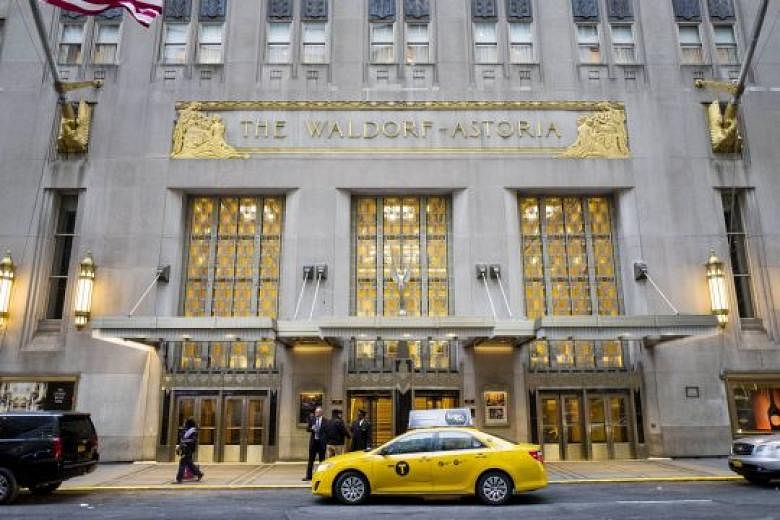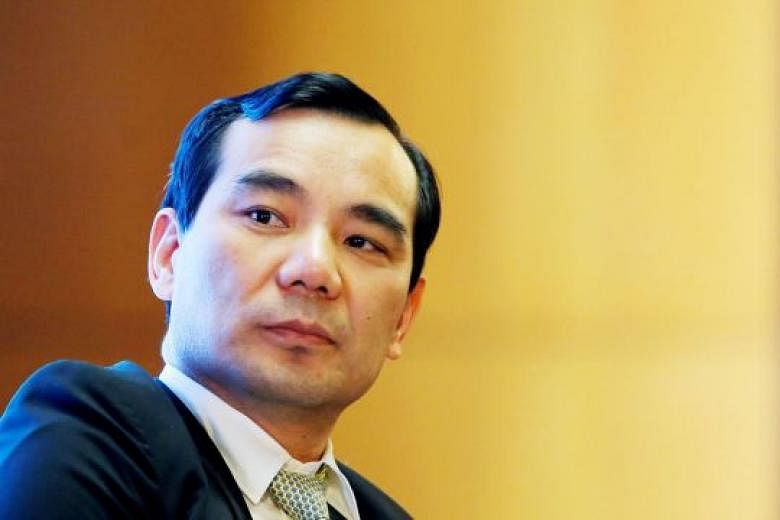BEIJING, SHANGHAI • The Chinese government said yesterday that it had seized control of Anbang Insurance, the troubled Chinese company that owns the Waldorf Astoria hotel in New York and other marquee properties around the world, and charged its former chairman with economic crimes.
The move is Beijing's biggest effort yet to rein in a new kind of Chinese company, in this case, one that spent billions of dollars around the world over the past three years buying up hotels and other high-profile properties.
The rise of these companies illustrates China's growing economic might, but Chinese officials have grown increasingly concerned that they were piling up debt to make frivolous purchases.
In a statement posted on its website yesterday, the China Insurance Regulatory Commission said the government was taking over to ensure the "normal and stable operation" of the company.
"Illegal operations at Anbang may have seriously endangered the company's solvency, prompting the government to take control," the statement read.
The move also caps the downfall of Anbang leader Wu Xiaohui. Mr Wu had married a granddaughter of Mr Deng Xiaoping, China's paramount leader in the 1980s and a towering figure in Chinese politics, and was widely considered politically connected.
But he was detained in June, suggesting that any political sway he might have once held has ebbed.
Anbang had also come under scrutiny in the United States and elsewhere for its opaque ownership structure. It is one of China's biggest insurance conglomerates. It claims 1.97 trillion yuan (S$411 billion) in assets and ranks 139 on the Global Fortune 500 list.
China's insurance regulator said yesterday that Anbang would be overseen for a year by a group that included China's central bank, its securities and banking regulators, the country's foreign exchange regulator and other government agencies. It said the business would operate as usual.
"The takeover management team will take effective measures to keep the company operating as usual and ensure that the legitimate rights and interests of consumers are fully protected and lawfully safeguard the legitimate rights and interests of all stakeholders," the insurance regulator said.
The move will put the Waldorf Astoria, for decades a symbol of New York elegance, under the control of the Chinese government.
Anbang in recent years also purchased the Westin St Francis hotel in San Francisco, the Loews Santa Monica hotel in California, and the Fairmont Chicago hotel, among other properties.
Anbang offered more than US$13 billion (S$17.2 billion) for Starwood Hotels and Resorts before abandoning its bid in 2016.
Mr Wu had also sought to extend his political ties in the United States. In November, he met with Mr Jared Kushner, the son-in-law and a top adviser of President Donald Trump, in a bid to buy a stake in a Manhattan office building partly owned by Mr Kushner's family firm. The deal was eventually abandoned after media coverage.
Though the political implications of Mr Wu's ouster are still unclear, analysts see the move as a way to shore up confidence in the company and signal tighter regulation to come.
It may also be part of Chinese President Xi Jinping's efforts to rein in the financial sector.
"We can see that the authorities intend to strike a balance between de-risking and financial stability," said Mr Zhou Hao, an economist at Commerzbank in Singapore, noting that personnel changes among the top financial regulators indicate that the targeting of company debt will intensify over the coming year.
Professor Zhang Lifan, a Chinese historian who closely tracks political and economic shifts, saw the news as way to ease global concerns about China's global influence.
"Alarm bells are now ringing across the world on China's rise and overseas expansion," he said. "China's overseas strategy is being met with resistance or targeted for investigation.
"Maybe this news is also sending a message to the West: that China is in fact ruled by financial order and laws which are not to be messed with by a company like Anbang."
NYTIMES, WASHINGTON POST, REUTERS


